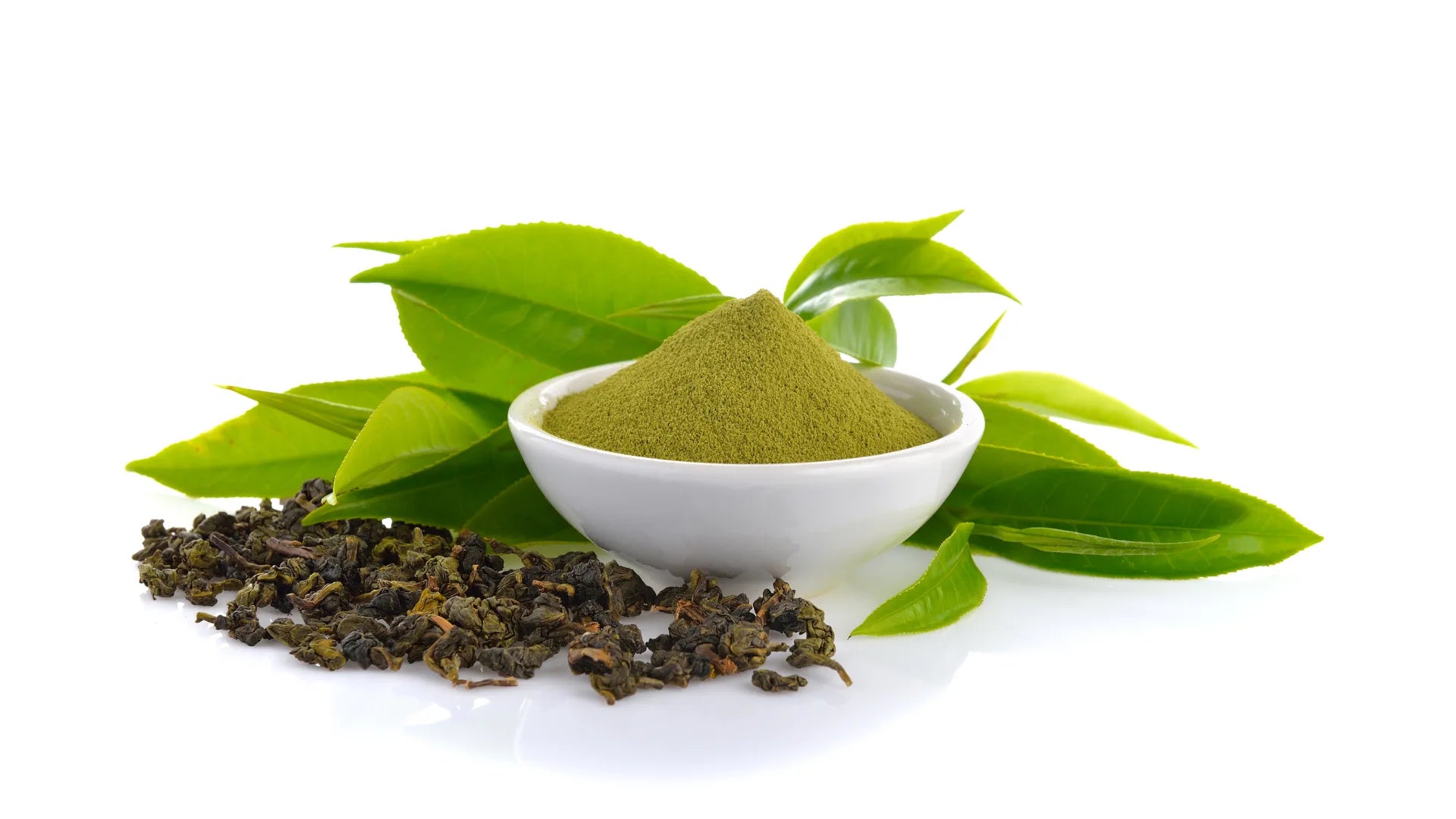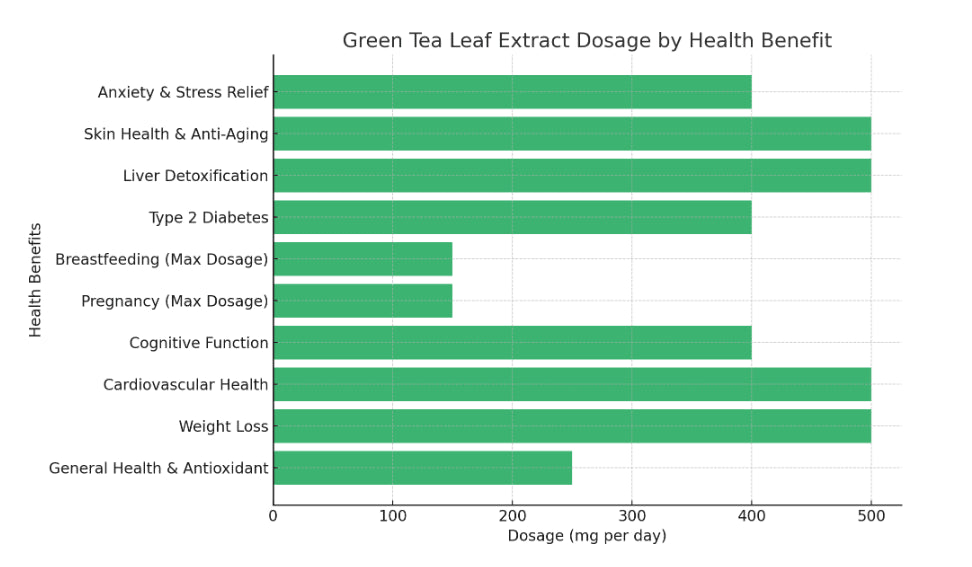
Green Tea Leaf Extract is derived from the leaves of the Camellia sinensis plant, which is rich in powerful antioxidants and beneficial compounds. Renowned for its high antioxidant content and potential therapeutic effects, this extract is widely used in dietary supplements.
The health benefits attributed to green tea leaf extract span a wide range, including weight management, improved brain function, cardiovascular support, and protection against oxidative stress. [1]
The beneficial effects of Green Tea Leaf Extract largely stem from its rich profile of bioactive compounds, particularly catechins. Among these, Epigallocatechin gallate (EGCG) is one of the most abundant and potent antioxidants, making it one of the top anti-aging ingredients. Other catechins, such as epicatechin, epicatechin gallate, and epigallocatechin, also contribute to green tea's antioxidant and anti-inflammatory properties. [2]
Green tea is packed with polyphenols, which function as powerful antioxidants that neutralize free radicals in the body, preventing cell damage and reducing inflammation. L-theanine is known to balance the stimulating effects of caffeine, leading to a calm but focused mental state. [3]
Miduty's Stop Aging supplement stands out with its premium Green Tea Leaf Extract standardized to 98% polyphenols and 45% EGCG, ensuring maximum potency. This extract, along with other powerful ingredients like Liposomal Trans-Resveratrol, Organic Grape Seed Extract, and Organic Acacia Fruit Extract, is designed to provide optimal anti-aging benefits.
Miduty Stop Aging supplement has 30 servings per container with the health expert recommending consumption of 2 capsules per day after taking a meal.
Miduty's Green Tea Leaf Extract, combined with trans-resveratrol utilizes liposomal encapsulation, enhancing its bioavailability and ensuring that your body absorbs it more efficiently than regular supplements.
Miduty's anti-aging supplement, green tea extract, is rich in catechins, particularly EGCG, which enhances the anti-aging benefits, helping to fight free radicals, improve cellular health, and maintain youthful skin.
| Uses & Benefits | Description |
| Skin Health |
Green tea extract is popular due to its anti-inflammatory and anti-aging properties. Green tea extract can help protect the skin from UV-induced damage, reduce acne breakouts, and improve skin elasticity. Its high antioxidant content helps fight free radicals, reducing the formation of wrinkles, fine lines, and age spots. [10] The anti-inflammatory properties help soothe irritated skin, reduce redness, and calm conditions like rosacea or eczema. |
| Rich Source of Antioxidants | Green tea is renowned for being one of the most antioxidant-rich natural substances available. Its high concentration of catechins, particularly EGCG, plays a vital role in neutralizing free radicals that can lead to cellular damage. [4] This potent antioxidant activity is essential for safeguarding cells against oxidative stress, a condition associated with chronic diseases such as heart disease, cancer, and neurodegenerative disorders like Alzheimer’s. |
| Weight Loss and Fat Burning |
Green tea leaf extract is widely included in weight loss supplements due to its ability to increase fat oxidation and metabolic rate. Research suggests that EGCG and caffeine can enhance thermogenesis (the process of heat production in the body), which helps the body burn more calories, even at rest. [5] Additionally, green tea has been shown to reduce fat absorption and support fat mobilization from fat cells, particularly during physical activity. |
| Brain Health and Cognitive Function |
The combination of caffeine and L-theanine in green tea extract is known for improving brain function. [6] Caffeine acts as a stimulant, enhancing mood, reaction time, and memory, while L-theanine induces a state of calm alertness by promoting alpha brain wave activity. EGCG also plays a role in neuroprotection by reducing oxidative stress in brain cells, potentially lowering the risk of neurodegenerative diseases such as Parkinson’s and Alzheimer’s. [7] |
| Heart Health |
Green tea leaf extract helps improve cardiovascular health. Catechins help reduce LDL cholesterol (often referred to as "bad" cholesterol) and prevent its oxidation, which is a key factor in the development of atherosclerosis (plaque buildup in the arteries). This leads to improved blood circulation and may lower the risk of heart disease, stroke, and heart attacks. [8] Additionally, regular consumption of green tea is associated with a reduction in blood pressure and inflammation in the blood vessels, further supporting heart health. |
| Blood Sugar Regulation | Research suggests that green tea extract may improve insulin sensitivity and lower blood sugar levels, making it beneficial for individuals with type 2 diabetes or those at risk. [9] It has been shown to reduce the absorption of carbohydrates in the digestive tract, which helps regulate blood sugar spikes after meals. |
| Detoxification and Liver Health |
Green tea extract supports the liver’s detoxification process by reducing oxidative stress and fat accumulation. It has been studied for its role in preventing liver diseases like non-alcoholic fatty liver disease (NAFLD). [11] By promoting the breakdown of fats and protecting the liver cells from inflammation, green tea extract helps maintain overall liver health. |
| Boosts Immunity |
The antioxidants and catechins in green tea extract have antiviral and antibacterial properties that enhance the body’s immune response. Regular consumption of green tea is linked to a lower incidence of infections, including the common cold and influenza. |

The adequate dosage of Green Tea Leaf Extract can vary depending on age, health status, and specific needs.
1. General Adult Dosage: For most healthy adults, the dosage of Green Tea Leaf Extract is 250-500 mg per day, standardized to 30-50% EGCG or 50-75% catechins.
2. Pregnancy and Breastfeeding: Keep total caffeine intake under 200 mg/day during pregnancy. Limit to 100-150 mg of Green Tea Extract per day to avoid high EGCG, which may interfere with folic acid and pose risks to the fetus. Breastfeeding is limited to 100 mg of caffeine daily, restricting Green Tea Extract to 100-150 mg/day to prevent excess caffeine exposure to the baby.
3. Weight Loss: A dose of 300-500 mg of Green Tea Extract daily, standardized to 50-75% catechins or 250-400 mg of EGCG, is often recommended for promoting fat oxidation and increasing metabolic rate.
4. Cardiovascular Health: 400-500 mg of Green Tea Extract daily (containing 150-200 mg of EGCG) has been shown to reduce LDL cholesterol, improve circulation, and protect the arteries from plaque buildup.
5. Cognitive Health (Improving Focus and Brain Function): A dose of 200-400 mg of Green Tea Extract, taken daily, is suggested for improving mental alertness and cognitive function.
6. Type 2 Diabetes (Blood Sugar Control): For blood sugar management, 300-400 mg of Green Tea Extract per day can help lower blood glucose levels and improve insulin sensitivity.
7. Liver Support and Detoxification: A dose of 250-500 mg per day has been shown to help with liver detoxification by supporting antioxidant pathways and reducing inflammation. Individuals with pre-existing liver conditions should use Green Tea Extract cautiously, as high doses of EGCG could potentially worsen liver function.
8. Skin Health and Anti-Aging: For skin protection and anti-aging benefits, a daily intake of 250-500 mg of Green Tea Extract is recommended.
9. Anxiety and Stress Relief: 200-400 mg per day can help alleviate anxiety due to the calming effects of L-theanine combined with mild stimulation from caffeine, leading to a state of "calm alertness."
The timing of Green Tea Leaf Extract intake can influence its effectiveness and benefits. Here are some recommendations:
1. General Health & Antioxidant Support: Take it in the morning or early afternoon. Taking it in the morning can provide a boost in energy and alertness throughout the day.
2. Weight Loss: Take it 30-60 minutes before meals. This may help to enhance fat oxidation and suppress appetite, aiding in weight management.
3. Cognitive Function & Brain Health: In the morning or during a mid-afternoon slump. It can enhance focus and mental clarity when taken at times when you need a cognitive boost.
4. Type 2 Diabetes: Take it before meals. This may help with blood sugar control when taken right before eating.
While Green Tea Leaf Extract is generally safe for most people, some precautions should be noted:
1. Caffeine Sensitivity: Individuals who are sensitive to caffeine may experience side effects like insomnia, anxiety, headaches, and heart palpitations, especially if taken in large amounts.
2. Liver Toxicity: High doses of EGCG (more than 800 mg daily) have been linked to liver toxicity in some rare cases. This is more likely with supplements than with brewed tea.
3. Iron Deficiency: The catechins in green tea can inhibit iron absorption from plant-based foods, potentially leading to anemia in susceptible individuals. It's advised to consume green tea extract between meals rather than with meals to avoid this issue.
4. Gastrointestinal Issues: Taking green tea extract on an empty stomach may lead to nausea or stomach upset due to its caffeine content.
5. Avoid Late Doses: To prevent potential sleep disturbances, it's best to avoid taking Green Tea Leaf Extract in the late evening or close to bedtime.
6. Hydration: Drinking water along with the extract can aid absorption and reduce any potential gastrointestinal discomfort.
In conclusion, Green Tea Leaf Extract, derived from the Camellia Sinensis plant, offers a multitude of health benefits due to its rich composition of antioxidants, polyphenols, and bioactive compounds like catechins and L-theanine.
Its ability to support weight management, enhance brain function, promote heart and liver health, and provide neuroprotective effects makes it a valuable addition to dietary supplements. Furthermore, its benefits extend beyond internal health, contributing to improved skin health and immune function. With its diverse applications and therapeutic potential, green tea leaf extract is a powerhouse of natural wellness support.
| Sr. No. | Reference |
|---|---|
| 1. | (PDF) GREEN TEA (CAMELLIA SINENSIS) AND ITS ANTIOXIDANT PROPERTY: A REVIEW |
| 2. | |
| 3. | Effects of l-theanine on attention and reaction time response - ScienceDirect |
| 4. | |
| 5. | |
| 6. | |
| 7. | |
| 8. | The Role of Catechins in Cellular Responses to Oxidative Stress |
| 9. | |
| 10. | |
| 11. |
